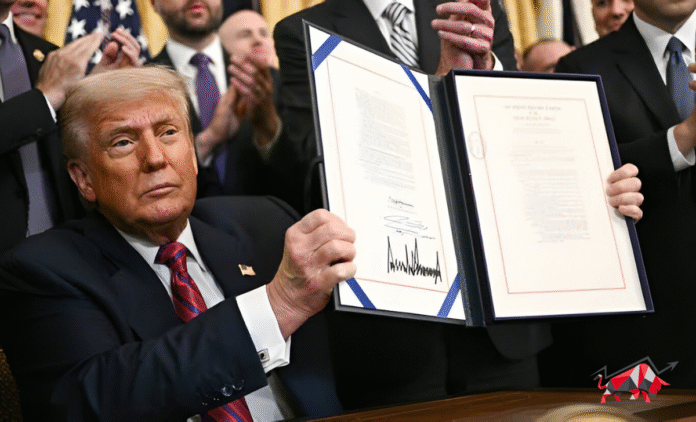The US House of Representatives has approved the GENIUS Act—short for the Guiding and Establishing National Innovation for U.S. Stablecoins Act—by a vote of 308 to 122. This landmark legislation, the first major crypto law passed by Congress, seeks to regulate stablecoins, setting a clear framework for banks and fintech firms to create dollar-backed digital tokens. The bill now awaits President Trump’s signature, following a similar bipartisan backing in the Senate on 17 June with a 68–30 vote.
What the GENIUS Act Entails
The GENIUS Act establishes rigorous standards for payment stablecoins, requiring issuers to maintain one-to-one reserves in liquid assets, such as US dollars or Treasury bills. It also imposes monthly audits and transparency rules, defines who may issue stablecoins, and distinguishes them legally from securities and commodities.
Under the bill, only federally licensed or state-certified issuers can operate. The Office of the Comptroller of the Currency or state regulators will supervise non-bank issuers over a certain threshold. The law also prohibits the issuance of interest-bearing stablecoins and forbids naming that suggests a link to the US government.
How It Came Together
The legislation was fast-tracked during “crypto week” in Congress, a period of intense legislative activity. The House passed two companion bills: the CLARITY Act, clarifying whether tokens count as securities or commodities under SEC or CFTC oversight, and the Anti‑CBDC Surveillance State Act, which blocks the Federal Reserve from issuing a central bank digital currency.
Though procedural delays occurred, some Republicans initially resisted, pushing for all three bills to be bundled together, House Speaker Mike Johnson and President Trump stepped in, resolving the impasse and securing final passage.
Industry and Political Backing
The crypto and banking industries welcomed the GENIUS Act. Major banks like JPMorgan, Citi, and Bank of America voiced strong support. JPMorgan CEO Jamie Dimon said the legislation would enable the bank to roll out its own stablecoin, while Citi’s Jane Fraser described it as “enthusiastic” progress toward equal footing in digital assets.
Advocacy groups lobbied hard, with crypto-aligned super PAC Fairshake spending over $260 million to elect supportive lawmakers. They aimed to counteract earlier legal pressure from the Biden administration and its aggressive SEC enforcement.
President Trump, whose business interests include crypto tokens, has championed the legislation. He compared the move to the creation of the Internet and pledged to make the US the global leader in cryptocurrencies. Critics, however, voice concerns over potential conflicts of interest and insufficient safeguards against money laundering.
Regulatory and Market Implications
The GENIUS Act designates stablecoins as neither securities nor commodities, preventing SEC overreach while granting the Commodity Futures Trading Commission some oversight. The CLARITY Act further defines regulatory frontiers for digital assets, with both the SEC and CFTC granted roles in evaluating tokens and trading platforms.
By criminalising interest-yielding stablecoins, the law seeks to avoid repayment failures and liquidity mismatches. Banks and fintech firms can now issue compliant stablecoins, boosting competition. However, a key exclusion prohibits non-financial corporations like Amazon or Walmart from issuing stablecoins without unanimous approval—currying potential favour with banks.
Shortcomings and Warnings
Consumer advocates and some lawmakers warn the law does not fully protect average users. Concerns around the GENIUs Act include lack of FDIC-like insurance, redemption risk, and hidden fees. Some progressive Democrats argue the legislation overly favours established banks and the crypto interests of certain political figures.
Market Reaction
Markets responded positively: crypto-related stocks rose, with Bitcoin hovering around $118,000–$120,000, and stablecoin issuers and banks seen as poised to benefit. SEC Chair Paul Atkins welcomed the adoption of stablecoin rules and indicated that the SEC may still introduce targeted regulatory exemptions for tokenised securities to facilitate innovation.


